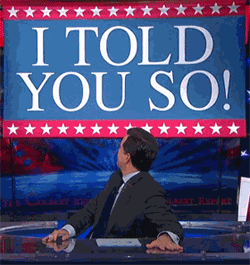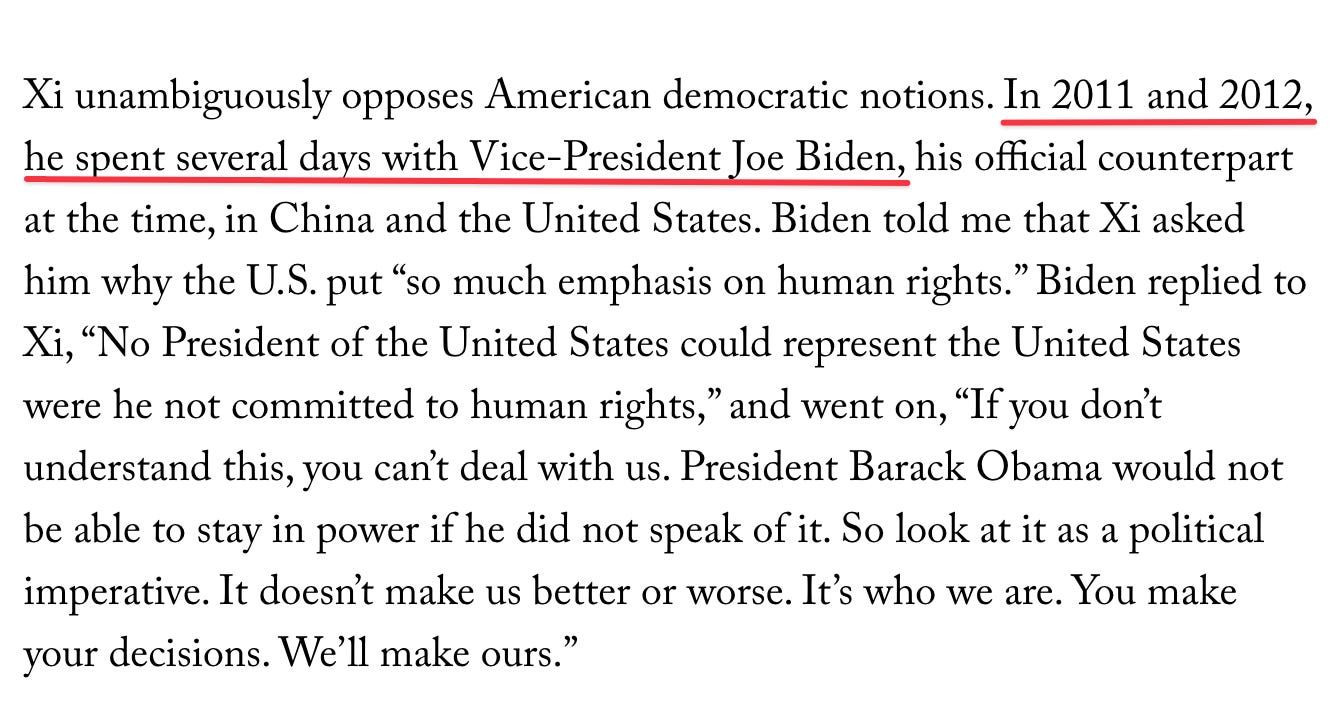T2B26: Xiden 11
The Shi of Biden
Newslet
I am beginning to read the French Sinologist, Francois Jullien’s ‘The Propensity of Things.’ It’s a book on a single Chinese idiogram/concept: Shi, which denotes the power of things, but imprecisely so.
I won’t say too much about the book itself, but juxtaposing a polysemic Chinese term next to more strictly defined Aristotelian terms strikes me as a successful intellectual strategy - it destabilizes both sides and opens up new terrains for inquiry.
Instead of writing about ‘Biden’s route to power’ I could call this entire series of T2B posts “The Shi of Biden;” that shift in perspective might reveal insights about how Biden will rule.
Moving on
This is the last post in the Xiden series. I am feeling pleased with myself for reading the tea leaves for an A- grade. Biden just gave an interview to Tom Friedman (Tom is back!), in which he says about China and trade:
On China, he said he would not act immediately to remove the 25 percent tariffs that Trump imposed on about half of China’s exports to the United States — or the Phase 1 agreement Trump inked with China that requires Beijing to purchase some $200 billion in additional U.S. goods and services during the period 2020 and 2021 — which China has fallen significantly behind on.
and how he’s going to create an international coalition that
gets every one of our — or at least what used to be our — allies on the same page. It’s going to be a major priority for me in the opening weeks of my presidency to try to get us back on the same page with our allies.
and back home he will
developing a bipartisan consensus at home for some good old American industrial policy — massive, government-led investments in American research and development, infrastructure and education to better compete with China
Building a “united front” on China will not be easy, but it will be a lot easier in 2021 than it would have been in 2019 given the pandemic and the PRC's behavior over the last year. Such a united front is something that could cause Xi and his CCP real problems. They know that and have been trying to forestall it, but somehow the diplomats who have armed their minds with Xi Jinping Thought on Diplomacy seem to be flailing at their attempts, at least among traditional US allies
Remember the Cold War strategy of Containment was a liberal strategy. Watch this space….
Raincheck
Too late to talk in this series, but I discovered that Xi spent several days with Biden in 2011-12 when he was one step removed from the pinnacle, like Biden.
I also discovered this essay on “Ideological Security as National Security” a bit too late to cover it in the Xiden series. Along with another essay by Tai Ming Cheung, we are beginning to see a coherent articulation of the Chinese National Security State.
China under Xi Jinping is seeking to establish itself as a leading power on the international stage, and the development of a more capable and assertive national security state is a critical component in this grand endeavor. This has meant that the country’s national security posture is in transition from being primarily defensively minded to combining both defensive and offensive elements. Xi talks about pursuing a "new type of international relations with win-win co-operation at its core,” forging a “community of destiny for humanity” that emphasizes peace, shared security, and common prosperity, and taking the “road of peaceful development.”
While I am as cynical as the next guy, I tend to take such pronouncements at face value - i.e., that Xi Jinping can simultaneously create a National Security State and see his historical destiny as taking the world on the road to peaceful development, just as the US was likely sincere about bringing freedom to Iraq.
The mismatch isn’t between overt truth and covert lie, but something else. A discussion for another day. Here’s what Lee Kuan Yew has to say about Xi 👇🏾
Can someone have iron in his soul and in Nelson Mandela’s class of persons? LKY thinks so. But it may also be that a National Security State has broad acceptance. In this essay on Xi, Andrew Nathan says:
Xi holds office at a time when the regime has to confront a series of daunting challenges that have all reached critical stages at once. It must manage a slowing economy; mollify millions of laid-off workers; shift demand from export markets to domestic consumption; whip underperforming giant state-owned enterprises into shape; dispel a huge overhang of bad bank loans and nonperforming investments; ameliorate climate change and environmental devastation that are irritating the new middle class; and downsize and upgrade the military.
And the system might well decide that such a complex moment needs a son of the people:
his two immediate predecessors, Jiang Zemin and Hu Jintao, exercised these roles within a system of collective leadership….This model does not produce leadership sufficiently decisive to satisfy Xi and his supporters. So Xi has sidelined the other members of the Politburo Standing Committee, except for the propaganda chief Liu Yunshan and the anticorruption watchdog Wang Qishan.
Modi is making similar moves in India. There’s nothing foregone about creating an authoritarian National Security State even in China but the possibility has opened worldwide and becoming more attractive by the day.
Correlating China and Climate
Let me end this exploration of China and the US with a quote about ‘shi’ from Jullien:
This is of course correlative thought at work - if you recall, I started the Xiden series with a hat tip to correlative thought.
Intuitively, it was clear to me that the transition (and any history or philosophy of the present) will benefit from correlative thinking, for the present moment forces us to move across domains - from climate to covid to national security to cabinet appointments and so on. I am hoping the ‘shi of Biden’ will give us the correlative conceptual tools to understand the transition in greater depth.
We typically use visual metaphors while discussing of intellectual cultures, but I am proposing an alternative, digestive approach to thought: of eating the ideas of cultures past and present, being nourished by them and then responding to the world we find ourselves. Jullien says:
That shift away from teleology is important for us, for it’s all too easy to read conspiracies, grand strategies and other teleological devices into the Trump to Biden transition (typical example: ‘Last hope for liberal internationalism’) but the present has too many possibilities to be reduced to a single teleological narrative. It has liberal internationalism, but it also has China, Climate and COVID and other minor planets that still exert a gravitational pull.
A few days of tidbits before I turn to climate.











